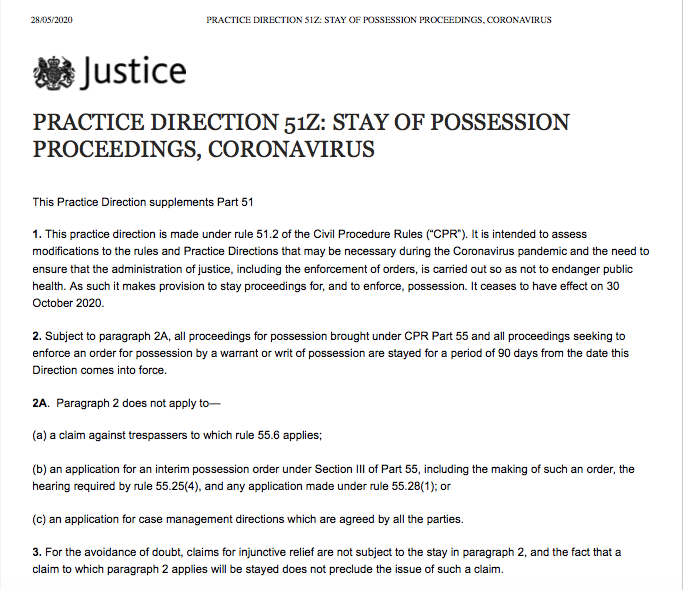In London Borough of Hackney -v- Okoro [2020] EWCA Civ 681 the Court of Appeal found that the automatic stay on possession proceedings imposed by Practice Direction 51Z also applies to appeals against possession orders. The stay has been imposed until 25 June 2020 and is likely to be reviewed alongside government guidance on COVID-19.
Practice Direction 51Z
Practice Direction 51Z was introduced on 27 March 2020 as part of the measures introduced in the face of the coronavirus pandemic for protection for tenants.
The main change introduced was that all possession proceedings brought under CPR 55 and all proceedings for enforcement of an order for possession (by a warrant or writ of possession) were stayed for a period of up to 90 days i.e. until 24 June 2020.
This effectively gave a three month licence for tenants of commercial properties and any claims against “trespassers” could be issued (particularly in the face of a limitation period) but were automatically stayed.
Following concerns raised by the Property Litigation Association, the Practice Direction was amended on 18 April 2020 to clarify that it excluded claims against trespassers within rule 55.6 of the CPR, or applications for interim possession orders.
Court of Appeal holds automatic stay of possession hearings applies to appeals
In London Borough of Hackney -v- Okoro [2020] EWCA Civ 681 the Court of Appeal held that the automatic stay on possession proceedings imposed by Practice Direction 51Z shall also apply to appeals against possession orders.
This case concerned a claim issued on 20 December 2019 by the London Borough of Hackney. On 24 January 2020, a possession order was granted by the court and refused permission to appeal. On 25 February 2020, the Defendant was granted permission to appeal and this was listed to be heard on 21 May 2020.
Practice Direction 51Z was implemented on 27 March 2020 and the appeal hearing was vacated and the case was sent to the Chancery Division and the parties were directed to file submissions on the issue of whether the appeal court had jurisdiction to hear the appeal during the stay. The claim was referred to the Court of Appeal to determine whether the stay in Practice Direction 51Z applied to appeals.
The appeal was allowed and the Court of Appeal held that Practice Direction 51Z does apply to appeals. The Practice Direction does not however apply to appeals to the Supreme Court as the Master of the Rolls had no jurisdiction to make Practice Directions affecting cases heard in the Supreme Court.
Expiry of stay under Practice Direction 51Z (25 June 2020)
The stay of possession proceedings is set to expire on 25 June 2020 although there is scope within Practice Direction 51Z for the stay to continue until 30 October 2020 however this is dependent on the status of COVID-19 and government guidance.
If the stay is lifted, possession claims which have been stayed will be re-listed and potentially at shorter notice as the court is likely to have availability following the lift of the lockdown. There will also be an increase in the issuance of claims for those who withheld from doing so due to the automatic stay.
It is not clear yet whether applications will be heard remotely or in person and due to social distancing measures which are likely to continue, the courts may continue to hold remote hearings.
If you are a landlord considering your options for possession, our expert property solicitors and barristers can assist.
If you are a tenant who has received a possession notice, order or warrant you should seek legal advice as soon as possible to understand your rights and protect your position.
Seeking possession: Section 21 and Section 8 Notices
A landlord can evict tenants who have an assured shorthold tenancy using a Section 21 or Section 8 notice, or both.
In most cases where it is available (and you should seek advice on the same), a Section 21 notice will be the preferred method of eviction, as it allows for accelerated possession proceedings. The court will be able to grant an order for possession ‘on the papers’, unless the tenant files a defence. It should be noted that the accelerated possession procedure does not allow for the recovery of rent arrears and a separate action should be brought for these if necessary.
A section 8 notice can be used if the tenant has broken the terms of the tenancy. Possession under section 8 can only be sought on one or more of the grounds set out in Schedule 2, i.e. possession cannot be obtained simply because the stated term of the tenancy has expired and the landlord would like the property back. There are 18 grounds, of which 8 are mandatory and 10 are discretionary. If one of the mandatory grounds is made out, the court must grant the order. If the application is made on one or more of the discretionary grounds, then the court has a discretion as to whether or not to grant the order.
Instruct Property Litigation Lawyers
We are a specialist City of London law firm made up of Solicitors & Barristers operating from the only law firm based in the Middle Temple Inns of Court adjacent to the Royal Courts of Justice. Our expert Property Litigation legal team deliver expert technical knowledge; the utmost expertise; strong negotiation skills and respected advice on possession, interpretation of leases, tenant insolvency, evictions, forfeiture, lease renewals and exercising break clauses which can make a pronounced difference in Landlord and Tenant and Real Estate disputes.

